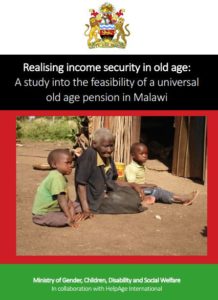[cmsms_row data_width=”boxed” data_color=”default” data_padding_top=”0″ data_padding_bottom=”50″ data_classes=”post.cmsms_post_cont_info”][cmsms_column data_width=”1/1″][cmsms_featured_block fb_bg_color=”#f7f7f7″ animation_delay=”0″]
 We were delighted to hear a study into the feasibility of a universal old age pension in Malawi had been carried out and launched towards the end of last year.
We were delighted to hear a study into the feasibility of a universal old age pension in Malawi had been carried out and launched towards the end of last year.
The Executive Summary highlights despite strong economic growth in recent years, Malawi continues to face substantial challenges of pervasive poverty and rising inequality. Half of the population (52.4 per cent) were living in poverty at the last count (2010), while many more are vulnerable to falling into poverty over time. Inequality has also risen sharply, with the Gini coefficient rising from 0.39 in 2004 to 0.45 in 2010, meaning the benefits of Malawi’s growing economy are limited to a select few.
Minimum social protection floors are increasingly recognised as a necessary and effective approach to ensure the benefits of development are shared fairly, and no one is left behind. This issue is no more relevant than for older people who – despite the contribution they have made throughout their lives – often struggle to secure an income. Social pensions have proven to be a successful approach to ensure income security for older people and their families, particularly in low income agricultural economies where the role of contributory pensions is more limited. This report therefore explores the rationale and feasibility for a universal social pension in Malawi.
Poverty and old age in Malawi
Addressing what happens to Malawians as they grow older is critical to successfully addressing the wider development challenges facing the nation. The 0.7 million older people aged 60 and over in Malawi today have spent their lives contributing to the development of the nation, and most continue to be active in their communities and wider society, as breadwinners, caregivers, and leaders in community, family and political life. Older people have also provided an invaluable safety net for Malawian society by caring for orphans left behind by the HIV/AIDS pandemic, with 62 per cent of double orphans cared for by their grandparents.
Growing old, nevertheless, comes with new challenges. Levels of chronic illness and disability increase with old age, which make it harder for older people to continue working in Malawi’s primarily agricultural economy. As health issues kick in, older people face a choice between continuing to work in increasingly vulnerable conditions, and looking for support from families that are already struggling with poverty. Most choose to continue working as long as they possibly can, despite greater challenges to remaining productive, and often having to work in pain.
As a result, many Malawians spend their later years marginalised from family and community life. As in many other countries, traditions of reciprocity is strong in Malawian society, with the idea that support must be both given and received. The increasing challenges that older people face in reciprocating the support they receive means they are often marginalised from decision making in families and communities. In extreme cases, this social exclusion is one of the reasons that older people – and particularly older women – are especially vulnerable to accusations of witchcraft.
Click here to link to Malawi Network of Older Persons’ Organisation (MANEPO) website where you can download the full study. MANEPO is an umbrella body for all organisations implementing programmes for older persons in Malawi and the network has a membership of over 40 organisations and through MANEPO, we hope to develop more links with these organisations in the future.
[/cmsms_featured_block][/cmsms_column][/cmsms_row]
